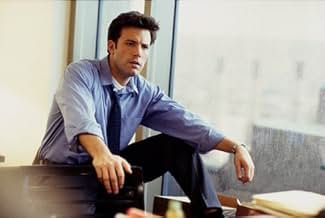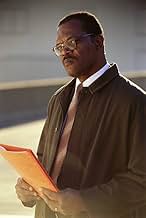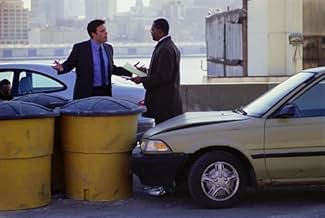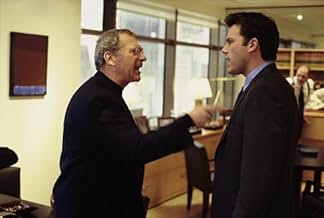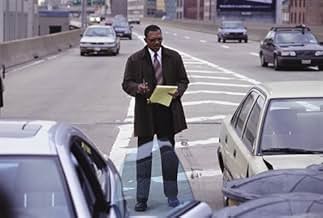आधुनिक समाज सही और गलत, भले और बुरे, बदले और पश्चाताप के बीच लकीर खींच देता है। एक पल का स्वार्थ और गुस्से की एक चिंगारी दो लोगों को आमने-सामने ले आती है। हठ की यह लड़ाई दोनों की ज़िंदगी हमे... सभी पढ़ेंआधुनिक समाज सही और गलत, भले और बुरे, बदले और पश्चाताप के बीच लकीर खींच देता है। एक पल का स्वार्थ और गुस्से की एक चिंगारी दो लोगों को आमने-सामने ले आती है। हठ की यह लड़ाई दोनों की ज़िंदगी हमेशा के लिए बदल देती है।आधुनिक समाज सही और गलत, भले और बुरे, बदले और पश्चाताप के बीच लकीर खींच देता है। एक पल का स्वार्थ और गुस्से की एक चिंगारी दो लोगों को आमने-सामने ले आती है। हठ की यह लड़ाई दोनों की ज़िंदगी हमेशा के लिए बदल देती है।
- पुरस्कार
- 7 कुल नामांकन
- Mina Dunne
- (as Jennifer Dundas Lowe)
- Gina Gugliotta
- (as Lisa Leguillou)
फ़ीचर्ड समीक्षाएं
What happens next would depend on the individuals involved and given the volatile nature of these individuals , it seems inevitable that one or both will blame the other for their problems that result from the collision and seek to strike back at the other to get revenge. This may sound immature and childish, but it is also frighteningly believable.
Most people may be very calm and rational most of the time, but when they believe that they have been provoked or wronged by another, reason and passion fly out the window and are replaced by anger, rage and throughts of revenge. Events quickly spiral out of control. Changing Lanes was very entertaining and very unpredictable in its depiction of the lengths that both characters go to in order to strike back at the other. Ben Affleck and Samuel Jackson give first rate performances.
Changing Lanes is much more complex than the trailer leads you to believe. From the preview, you'd think it is an action fan's over-revved, simple-minded revenge thriller with lots of vehicular mayhem. Believe it or not, it does more peeling back of the layers of insulation of the affluent/powerful end of the social spectrum than any film I have seen lately. (--And not in the way the disappointingly too-pat-to-downright-absurd 'John Q' did, either.)
It's a film noir, and one of the darkest at that, full of despair, cynicism and scathing revelations about human nature. It seems to say-- or really, and this is a major distinction, to be about characters some of whom believe-- that we all make deals of personal expedience with Morality, that no one escapes life formation uncompromised and therefore able to comment on or judge anyone else's choices or actions. It's the old amoral, nihilistic/relativistic universe routine, which says concepts of fairness, justice or morality are quaintly irrelevant, that stuff just keeps happening, always has and always will, que sera sera.
My favorite scene, which was revolting and ugly and creepy as anything in any horror film you can name, is when Affleck sits down in a fine restaurant to discuss with his wife the morality of the situation he has been sucked into and is getting in deeper by the hour. He recognizes rightly that his game of oneupmanship, and win-at-any-cost has gotten insanely out of control. He is beginning to question it all, everything in his life. He comes to his wife for solace, direction, insight, a hint of moral rectitude, any help she can offer. She helps him, alright-- by saying she knows he does dishonest things (like having an affair with a woman at the office, which up until she springs that, he thought was his little secret) and that she could have had an honest husband, if that was all she wanted. --Why would she make a scene over an infidelity and risk interrupting the flow of her resources, anyway, she asks. He splits the dinner, dazed and even more desperate. In the next scene we witness him doing more of those very things he has just been having moral anguish over. (Maybe he can't recognize the feel of moral anguish at first.)
The Affleck character has a tremendous amount at stake, courtesy a pretty nifty plot hook, that keeps him up to some very dirty tricks. Sure, he doesn't want to risk interrupting the flow of his resources, either. But I think it's clear that the real reason he keeps doing crummy things is because he is a man compulsively drawn to the rewards of a destructive mode of behavior. Others gamble or drink or eat too much. Affleck works the system, lying, cheating, and treating all people like garbage. That's his high, his inescapable need. He can't quit. (Late in the film, he agrees to hire an idealistic young intern because, he laughs uncontrollably to himself, he wants to see what the intern's optimism and altruism looks like after 5 years of hard weathering by his no-rules-in-life employer.) Affleck is sick, and while he finally recognizes that sickness, he resigns himself to keep doing the same thing because, as his boss tells himself, he is willing to believe he has done more good than harm at the end of the day. The Affleck character's motivations for being extra bad, in the episode of his life we glimpse here, are strong enough to keep Changing Lanes from being just another American psycho study; it's easy to believe we could turn Affleck, given a similar circumstance in our life.
The ending is a somewhat forced positive one, but not nearly as much a sell out as is usually the case with a made-by-committee major commercial film. I give the whole enterprise 8.5 out of 10 stars.
High real world stakes.
Until the last ten d*** minutes when Afleck becomes essentially a super hero and fixes all the consequences for Jackson, despite how clear it was made throughout that most of these things could not be fixed.
Such an intelligent story ruined by one of the most careless yet brazen Hollywood endings in history.
I know *why* they make Hollywood endings, but I strongly suspect anyone that sat through this disturbing tale could handle a real ending. This ending is tantamount to all the dead people in Alien or one of the Hannibal Lecter movies all being AOK at the end.
Samuel L. Jackson was well appointed as Doyle Gipson, and portrays his part well. One character's next move to destroy the other makes compelling viewing, and we can actually feel some sympathy for them, as we see both their emotional and compassionate side.
The story flows well as we are drawn into Banek and Gipson's desire to cause pain and hurt, not giving any thought to others who maybe affected by what they are doing. Changing Lanes is not a violent film as such, it simply explores the aspects of revenge in what could be a true-to-life measure. This is what makes it an entertaining and gripping movie that proved a winner for myself, and should do for many other film fans.
क्या आपको पता है
- ट्रिवियाA day after the terrorist attacks of September 11, 2001, director Roger Michell had the World Trade Center towers digitally removed from the opening main title sequence in the film. In the DVD commentary, he admitted that it was a mistake to erase them, and make it appear as if they did not exist. During the re-editing of the film, Michell reinserted them as a tribute.
- गूफ़When Gavin Lights the paper on fire and raises it to the sprinkler head, that type of sprinkler head would only discharge the water. No other heads would spray water. The reason for this is to minimize damage.
- भाव
Doyle Gipson: I hope you don't mind, but I was intrigued by your conversation. I just thought you were in advertising. So I want to give you my dream version of a Tiger Woods commercial, okay? There's this black guy on a golf course. And all these people are trying to get him to caddy for them, but he's not a caddy. He's just a guy trying to play a round of golf. And these guys give him a five-dollar bill and tell him to go the clubhouse and get them cigarettes and beer. So, off he goes, home, to his wife and to their little son, who he teaches to play golf. You see all the other little boys playing hopscotch while little Tiger practices on the putting green. You see all the other kids eating ice cream while Tiger practices hitting long balls in the rain while his father shows him how. And we fade up, to Tiger, winning four Grand Slams in a row, and becoming the greatest golfer to ever pick up a 9-iron. And we end on his father in the crowd, on the sidelines, and Tiger giving him the trophies. All because of a father's determination that no fat white man - like your fathers, probably - would ever send his son to the clubhouse for cigarettes and beer.
- क्रेज़ी क्रेडिटThanks to the staff and Militia Force members and veterans at the Marcy Avenue Armory, Brooklyn, New York.
- इसके अलावा अन्य वर्जनThere was an early review of the movie that contained a spoiler of the ending. The ending that was originally used involved Ben Affleck and Samuel L. Jackson getting into a fist fight that leads onto the balcony. They talk about right and wrong and Affleck takes the file and tears it up and the movie fades to credits. This ending was most likely cut because test audiences did not like it. It will most likely appear on the DVD. Also a small clip shown in the TV ads shows Affleck and Jackson fighting on the balcony. This was part of the original ending which explains why it was cut.
- कनेक्शनFeatured in Changing Lanes: The Writer's Perspective (2002)
टॉप पसंद
- How long is Changing Lanes?Alexa द्वारा संचालित
विवरण
- रिलीज़ की तारीख़
- कंट्री ऑफ़ ओरिजिन
- भाषा
- इस रूप में भी जाना जाता है
- Fuera de control
- फ़िल्माने की जगहें
- उत्पादन कंपनियां
- IMDbPro पर और कंपनी क्रेडिट देखें
बॉक्स ऑफ़िस
- बजट
- $4,50,00,000(अनुमानित)
- US और कनाडा में सकल
- $6,68,18,548
- US और कनाडा में पहले सप्ताह में कुल कमाई
- $1,71,28,062
- 14 अप्रैल 2002
- दुनिया भर में सकल
- $9,49,35,764
- चलने की अवधि1 घंटा 38 मिनट
- रंग
- ध्वनि मिश्रण
- पक्ष अनुपात
- 2.35 : 1
इस पेज में योगदान दें



